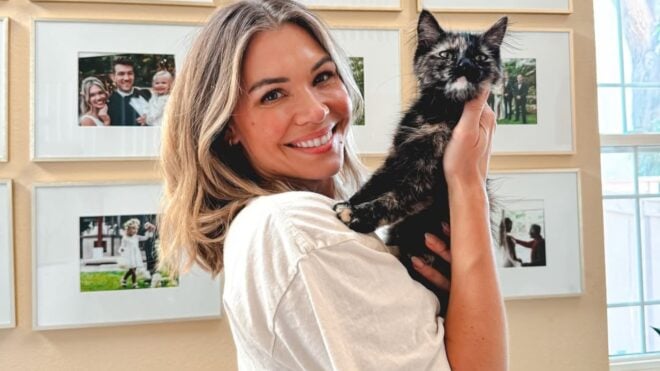
In this article
If your partner has anxiety — or you think they may — chances are, it’s already affected your relationship. Maybe they’ve wanted to back out of a party you’ve agreed to attend or they’ve had a panic attack when faced with a big (or even small) decision.
Podcaster and blogger Janet Stanley (name has been changed) says her husband started to experience anxiety around age 49, when their daughter got her driver’s permit. Stanley thinks the condition may also have been triggered by his reaching middle age.
“He began having panic attacks when he was driving in mountain passes, bridges, tunnels, and, weirdly, in some wide open spaces. There was no rhyme or reason for it,” she told Mom.com. “He kept it to himself for over a year, but as time went on it got worse, and then on a family road trip to check out colleges, he could not hide it any longer. Especially since he needed to pull the car over and let me take over the driving.”
After an episode nine years ago, her husband asked his doctor for a Xanax prescription and later began seeing a psychiatrist. Though his condition is mostly managed, he still has to take meds to treat occasional episodes of anxiety.
Stanley’s husband’s situation is not uncommon. According to the Anxiety and Depression Association of America, anxiety disorders affect about 40 million (about 18.1%) adults 18 and over in the United States.
How to know if your partner has anxiety

While every person may have moments of feeling anxious or nervous, anxiety disorders have certain characteristics and have several risk factors, according to the ADAA, and include genetics, brain chemistry, and life events.
There are several types of disorders, including:
- Generalized anxiety disorder: According to the ADAA, GAD is characterized by “persistent and excessive worry about a number of things.” GAD is diagnosed when a person has difficulty controlling their worry for more days than not over a 6-month period. It affects about 6.8 million people, the majority of them women.
- Panic disorder: The ADAA says a panic disorder is when a person experiences seemingly out-of-nowhere panic attacks and are fearful of a recurrence. A panic or anxiety attack can involve heart palpitations, shortness of breath, trembling or shaking, sweating, nausea, dizziness, and other symptoms.
- Social anxiety disorder: This anxiety disorder, also called social phobia, is characterized by intense fear of being judged, rejected, or negatively perceived by others. It goes beyond shyness and can impact the choices people make around work, travel, and relationships.
Can anxiety ruin relationships?

With so many people affected by anxiety disorders, it goes without saying that many relationships involve at least one person with an anxiety disorder. The type of anxiety a partner has may have an impact. For example, according to Christian Hahn at the University of Western Ontario, high levels of social anxiety are linked to “low levels of trust and perceived support” in a romantic relationship.
“Anxiety doesn’t live in a vacuum,” psychologist and author Carolyn Daitch told Health.com. “Even in the most loving relationships, if one partner has anxiety, it can really strain the relationship and dampen the trust and the intimacy, and it can make for frustration when neither gets their needs met.”
What to do (and what not to do) if your partner has anxiety

- Encourage your partner to see a doctor
If your partner has an anxiety disorder, or you think they may, it’s important that they get medical attention. According to the ADAA, anxiety disorders are highly treatable, yet fewer than 37% of sufferers seek help. - Don’t be a superhero
“Partners may find themselves in roles they do not want, such as the compromiser, the protector, or the comforter,” therapist Kate Thieda wrote in her book, Loving Someone with Anxiety. Constantly taking on duties or accommodating your partner in situations that cause anxiety can make you resentful and can actually exacerbate your partner’s condition, Thieda said. - Set appropriate boundaries
As with all relationships, setting boundaries with your partner is important. When your partner has anxiety disorder, you have to make sure their needs don’t override your own, Theida advised. When speaking to your partner, she recommends using “I” statements. For example, instead of saying, “You worry too much about what other people think of you,” try saying, “I’m concerned that your fears about what others think of you are holding you back at work.” - Focus on relaxation and self-care whenever possible
Again, relaxing together and taking care of your own needs are important in any relationship, but finding ways to do both when your partner suffers an anxiety disorder should be a priority, said Thieda. - Remember that you’re not alone
In the case of her husband, Stanley said sometimes support takes the form of reminding him how common his condition is. “My role as his partner is to be supportive and not judgmental, to remind him that getting help is a sign of strength and rationality and not weakness,” she said. “And that a lot of people take all kinds of meds to handle stress and anxiety.”







